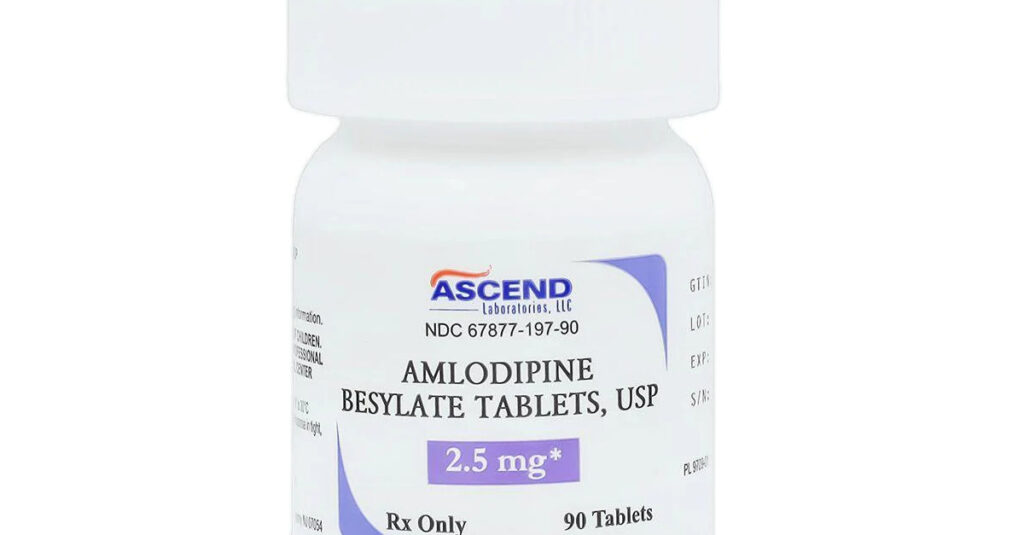Poison Control, run by the American Association of Poison Control Centers, has published a comprehensive Q&A on amlodipine, a medication that lowers blood pressure. Amlodipine is often prescribed by doctors to those who suffer from hypertension
How does amlodipine work?
A cardiovascular medication called amlodipine, also known as Amvaz, Katerzia, and Norvasc, lowers blood pressure in individuals with high blood pressure (hypertension) and relieves symptoms of chest pain.
Are there any side effects associated with amlodipine?
Is there a risk of weight gain when taking amlodipine?
Weight gain is unlikely to occur with amlodipine. A controlled clinical trial found that fewer than 1% of participants gained weight.
Is amlodipine associated with hair loss?
Hair growth and hair loss are not affected by amlodipine.
How dangerous is amlodipine, and does it cause swelling (edema)?
Ankles and legs may swell when taking amlodipine. Although the swelling may be troublesome, it should not be cause for immediate concern. Depending on your side effects, your doctor may recommend another blood pressure medication.
Amlodipine causes constipation, does it not?
Constipation is unlikely to occur with amlodipine. Constipation was reported by less than 1% of participants in study trials.
Amlodipine and food interactions: what are they?
According to one study, drinking grapefruit juice once a day while taking amlodipine increased the amount of drug absorbed, but did not affect blood pressure. Food and grapefruit juice are both acceptable ways to take amlodipine.
Amlodipine and alcohol: Can they be taken together?
Even if you consume alcohol in excess of moderate amounts (1 drink per day for women or 2 drinks per day for men), it may increase your blood pressure. Alcohol consumption should be limited by people with high blood pressure. The effects of amlodipine are not directly affected by alcohol.
How does amlodipine work?
The calcium channel blocker amlodipine relaxes the heart muscle and smooth muscles in the vascular system, resulting in relaxed blood vessels. Blood pressure is lowered by relaxing blood vessels. The heart is deprived of oxygen when it suffers from angina. By relaxing blood vessels that supply the heart, amlodipine increases oxygen flow to heart muscle, preventing angina. The heart works less and needs less oxygen when the blood pressure is lowered.
What makes amlodipine different from other blood pressure medications?
Amlodipine reduces blood pressure directly by relaxing blood vessels, unlike other blood pressure medications. There are other classes of blood pressure lowering medications with different mechanisms of action. Similarly, lisinopril (Zestril, Prinivil) dilates blood vessels indirectly by preventing the body from producing a protein that narrows them. By causing the kidneys to excrete more sodium, hydrochlorothiazide (Microzide) lowers blood pressure. This causes urination, leading to a loss of fluid.
When pregnant, can I take amlodipine?
In pregnancy, labetalol and methyldopa are the first line of treatment for hypertension. Amlodipine is also considered safe during pregnancy by the American Heart Association. The use of amlodipine in the first trimester was found to be safe in one large study.
Amlodipine overdose symptoms: what are they?
A dangerous lowering of blood pressure and increased heart rate can result from an overdose of amlodipine. Shock and acute kidney failure may also result from overdose.
Amlodipine overdose or accidentally taking it
Poison Control should be contacted if you or someone you know is experiencing adverse reactions to amlodipine or if they may have overdosed on it. Call 911 if the person is unconscious, having difficulty breathing, or unable to breathe. You can get poison control help online at poison.org or over the phone at 1-800-222-1222. There are two options available at any time, both of which are free and confidential.






